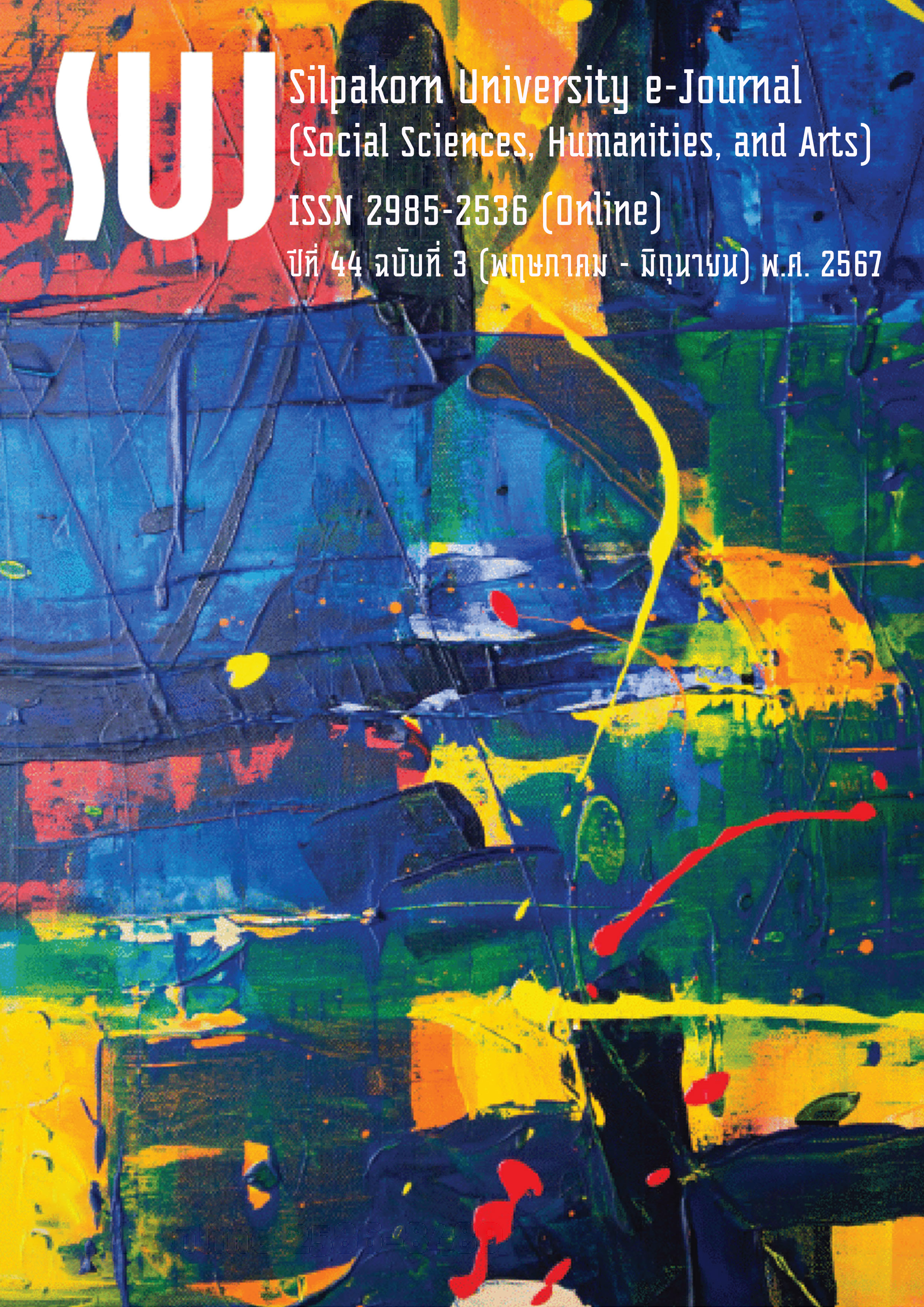การพัฒนารูปแบบการจัดการท่องเที่ยวเชิงกีฬาและสุขภาพด้วยกิจกรรมกีฬาเรือประเภทกระดานยืนพายอย่างยั่งยืน (The development of a sports and health tourism management model through sustainable Stand-Up Paddle Board (SUP) activities)
Main Article Content
Abstract
การพัฒนารูปแบบการจัดการท่องเที่ยวเชิงกีฬาและสุขภาพด้วยกิจกรรมกีฬาเรือประเภทกระดานยืนพายอย่างยั่งยืนมีวัตถุประสงค์เพื่อพัฒนาและประเมินรูปแบบและเพื่อสร้างเครือข่ายความร่วมมือด้านการจัดการท่องเที่ยวเชิงกีฬาและสุขภาพด้วยกิจกรรมเรือประเภทกระดานยืนพายอย่างยั่งยืน กลุ่มเป้าหมายแบ่งออกเป็น 4 กลุ่ม คือ 1) กลุ่มผู้เชี่ยวชาญสำหรับการพัฒนารูปแบบ 2) กลุ่มผู้เชี่ยวชาญตรวจสอบคุณภาพเครื่องมือ 3) กลุ่มผู้นำรูปแบบไปจัดโครงการฯ และ 4) กลุ่มนักท่องเที่ยวเชิงกีฬาและสุขภาพที่เข้าร่วมกิจกรรมการแข่งขันกีฬาเรือประเภทกระดานยืนพาย เครื่องมือวิจัย ได้แก่ แบบประเมินค่า 5 ระดับ เป็นแบบประเมินความพึงพอใจ และแบบประเมินความสำเร็จของโครงการ ผลการวิจัยพบว่า 1) ด้านการพัฒนารูปแบบการจัดการท่องเที่ยวเชิงกีฬาและสุขภาพด้วยกิจกรรมกีฬาเรือประเภทกระดานยืนพายอย่างยั่งยืน มีความเหมาะสมและมีค่าความสอดคล้องอยู่ระหว่าง 0.90-1.00 2) ด้านการประเมินรูปแบบโดยประเมินความสำเร็จของการจัดโครงการการแข่งขันกีฬาเรือกระดานยืนพาย รายการ KU-SUP for Fun พบว่า โครงการบรรลุผลสำเร็จทุกตัวชี้วัด ด้านปริมาณ พบว่า มีผู้เข้าร่วมโครงการคิดเป็นร้อยละ 90 และด้านคุณภาพ พบว่า ผลประเมินความพึงพอใจในภาพรวมอยู่ในระดับมากที่สุดทุกด้าน ความสำเร็จทุกด้านของโครงการอยู่ในระดับสูง และส่งผลให้มีการดำเนินงานการจัดทำความร่วมมือระหว่างมหาวิทยาลัยเกษตรศาสตร์และสมาคมกีฬาเรือพายแห่งประเทศไทย ซึ่งสามารถนำรูปแบบไปเป็นแนวทางการจัดโครงการและกิจกรรมเพื่อการส่งเสริมการท่องเที่ยวเชิงกีฬาและสุขภาพด้วยกระดานยืนพายต่อไปได้
The objective of developing a sports and health tourism management model through sustainable Stand-Up Paddle Board (SUP) activities was to develop and evaluate the model and establish a network of cooperation in sports and health tourism management through sustainable SUP activities. The target population was divided into four groups: 1) a group of experts for developing the model, 2) a group of experts for verifying the quality of the research instruments, 3) a group of people using the model to organize projects, and 4) a group of sports and health tourists participating in stand-up paddle board competitions. The research instruments include a 5-level evaluation comprising a satisfaction survey and a project success evaluation form. The research finding revealed that: 1) the development of a sports and health tourism management model through sustainable stand-up paddle board sports activities is appropriate, with an IOC ranging between 0.90-1.00. 2) In evaluating the model by assessing the success of the KU-SUP for Fun project, it was found that every project indicator was achieved. In terms of quantity, 90 percent of participants joined the project, and in terms of quality, the overall satisfaction evaluation was at the highest level in every aspect. The success in every aspect of the project was at a high level. This led to the establishment of a collaboration effort between Kasetsart University and the Rowing and Canoeing Association of Thailand. Therefore, the model can serve as a guideline for organizing projects and activities to promote sports and health tourism with stand-up paddle boards.
Downloads
Article Details

This work is licensed under a Creative Commons Attribution-NonCommercial-NoDerivatives 4.0 International License.
References
Anthony, W. P. (1978). Participative Management. MA: Addison-Wesley.
Buhalis, D. (2000). Marketing the competitive destination of the future. Tourism Management, 21(1): 97-116.
Burrow, J. L., & Kleindl, B. (2013). Business Management (13th ed.). NY: McGraw-Hill.
Carvache-Franco, M., Hassan, T., Orden-Mejía, M., Carvache-Franco, O., & Carvache-Franco, W. (2024). Motivations and satisfaction of sports tourists during the FIFA world cup in Qatar 2022. Heliyon, 10(5): e26682.
Cochran, W. G. (1977). Sampling Techniques (3rd ed.). NY: John Wiley & Sons.
Hall, C. M. (1992). Hallmark Tourist Events: Impacts, Management and Planning. London: Belhaven Press.
Hinch, T., & Hignham, J. (2004). Sport Tourism Development. Clevedon: Channel View Publications.
Hjalager, A.-M. (2011). The invention of a Danish well-being tourism region: Strategy, substance, structure, and symbolic action. Tourism Planning & Development, 8(1): 51-67.
International Canoe Federation. (2017). SUP Canoe Racing Competition Rules 2017. [Online]. Retrieved March 16, 2021 from https://www.rcat.or.th/wp-content/uploads/2020/10/ICF-SUP-Rules.pdf
Kim, C., & Kim, J. (2023). Spatial spillovers of sport industry clusters and community resilience: Bridging a spatial lens to building a smart tourism city. Information Processing & Management, 60(3): 103266.
Kotler, P. (1997). Marketing Management: Analysis, Planning Implementation, and Control (9th ed.). Upper Saddle River, NJ: Prentice Hall.
Ministry of Tourism and Sports. (2017). Final Report: Project to Develop Business Models for Sports Tourism in Thailand (Sports Tourism) for the Year 2017 (รายงานฉบับสมบูรณ์ : โครงการพัฒนารูปแบบทางธุรกิจของการท่องเที่ยวเชิงกีฬาของไทย (Sports Tourism) ประจำปี 2560). Bangkok: Economics Tourism and Sports Division, Ministry of Tourism and Sports.
Office of the Permanent Secretary, Ministry of Tourism and Sports. (2016). National Sports Development Plan No. 6 (2017-2021) (แผนพัฒนาการกีฬาแห่งชาติ ฉบับที่ 6 (พ.ศ. 2560-2564)). Bangkok: WVO Office of Printing Mill, The War Veterans Organization of Thailand Under Royal Patronage of His Majesty the King. [Online]. Retrieved March 16, 2021 from https://nsdf.or.th/7444/
Office of the Permanent Secretary, Ministry of Tourism and Sports. (2017). National Tourism Development Plan No. 2 (2017-2021) (เเผนพัฒนาการท่องเที่ยวแห่งชาติ ฉบับที่ 2 (พ.ศ. 2560-2564)). Bangkok: WVO Office of Printing Mill, The War Veterans Organization of Thailand Under Royal Patronage of His Majesty the King. [Online]. Retrieved March 16, 2021 from https://www.ubu.ac.th/web/files_up/03f2017052216244626.pdf
Office of the Permanent Secretary, Ministry of Tourism and Sports. (2023). National Tourism Development Plan No. 3 (2023-2027) (แผนพัฒนาการท่องเที่ยวแห่งชาติ ฉบับที่ 3 (พ.ศ. 2566-2570)). [Online]. Retrieved February 20, 2024 from https://province.mots.go.th/ewtadmin/ewt/ranong/download/article/article_20230418122435.pdf
Sakkaew, Panya, & Utumpa, Paveena. (2022). Sport tourism development model for sports service in Krabi Province (รูปแบบการพัฒนาการท่องเที่ยวเชิงกีฬาสำหรับการบริการกีฬาของจังหวัดกระบี่). Academic Journal of Thailand National Sports University, 14(2): 97-110.
The Rowing and Canoeing Association of Thailand. (2020). Stand Up Paddling Board. [Online]. Retrieved March 16, 2021 from https://www.rcat.or.th/wp-content/uploads/2020/09/SUP-Thailand.pdf
Wonhsuwan, Niwes, & Siriwan, Intha. (2017). The participative management (การบริหารแบบมีส่วนร่วม). Mahachula Academic Journal, 4(1): 176-187.


